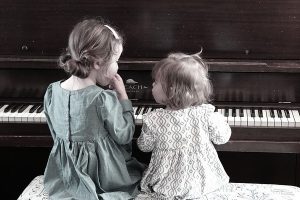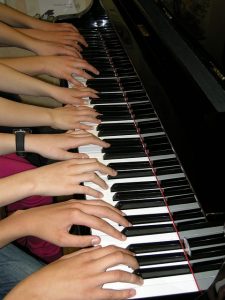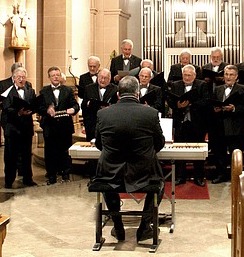At my Parramatta Music School, performance and playing with others is encouraged as an essential element in developing new skills on the piano and increasing enjoyment and motivation.
In my first article on performance, I discussed the benefits of performing solo, and suggested opportunities to develop your performance skills. This article is about performing with others.
Performing With Others
The piano is like a full orchestra on its own – we don’t need to play with other people. While it’s fun being able to create all the sounds yourself, sometimes it’s nice to play as part of an ensemble, and you will find that playing with others can be really fun! It requires a set of skills quite different from that of playing solo piano – you learn how to listen to others, how to keep in time and how to keep going if you make a mistake. Ultimately it can help you learn to play piano by ear and improvise.
Playing Piano with your Teacher
Piano duets are really enjoyable, and can be done very early from the first piano lessons. They help you to learn to play in time and keep the beat. A simple beginner piece can come alive if I play some accompanying chords and some students love the sound of the harmonies! There is a large repertoire of piano duets at all levels.
Piano Accompanying
There may be opportunities as a pianist to accompany a song at school or at Church. Start with one song (I can simplify it for you if it’s too difficult), then gradually add more songs. Ask if you can have a regular opportunity to play – it helps you to improve your accompanying skills. You might ask to be put on a roster with other students who also want to play.
You may have friends who play other instruments. As you progress, there may be opportunities to accompany them at concerts and for their exams.
Playing Piano in a Band or Ensemble
Your school, community group or church group may have a band. If you join, you will learn some great new pieces and expand your repertoire. There might be a part written out for a pianist, or you can play in the percussion section. You will have a head start if you already play piano, and it really helps to develop sight reading skills and teaches you how to keep going – the band won’t wait for you if you make a mistake!
Playing with a Backing Track
Backing tracks help to make your piece come alive – they are the next best thing to playing with a band or orchestra, and help to develop the same skills. We use these in my lessons, and they can also be used at home – some of my students really like to play this way.
Playing  Informally
Informally
It doesn’t have to be difficult learning to play by ear and improvise with others. You can start by playing the melody together in unison. Once you are at an intermediate level, I can help you to work out a simple accompaniment of chords and a bass line. It might involve transposing, which is a great skill to develop. We do some harmonisation and transposition at my Parramatta music school. Ultimately I aim for the advanced students to learn to do this for themselves, which can be very satisfying.
In my piano studio, I encourage my students to play music together with others to help them learn to love music and become well-rounded musicians.
Piano Lessons In Parramatta is a Parramatta Music School specialising in piano lessons. and let’s get started!
Phone: 0499 500 294

